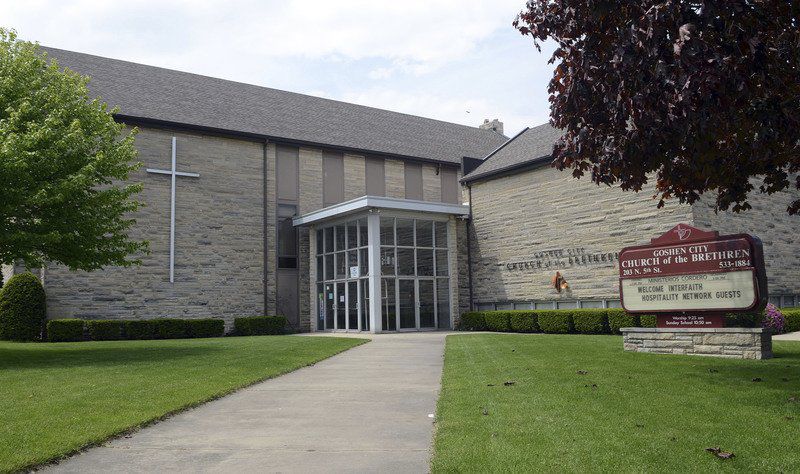
Preached at Goshen City CoB, April 29, 2018

John 15:1-8 New Revised Standard Version (NRSV)
15 “I am the true vine, and my Father is the vinegrower. 2 He removes every branch in me that bears no fruit. Every branch that bears fruit he prunes to make it bear more fruit. 3 You have already been cleansed by the word that I have spoken to you. 4 Abide in me as I abide in you. Just as the branch cannot bear fruit by itself unless it abides in the vine, neither can you unless you abide in me. 5 I am the vine, you are the branches. Those who abide in me and I in them bear much fruit, because apart from me you can do nothing. 6 Whoever does not abide in me is thrown away like a branch and withers; such branches are gathered, thrown into the fire, and burned. 7 If you abide in me, and my words abide in you, ask for whatever you wish, and it will be done for you. 8 My Father is glorified by this, that you bear much fruit and become my disciples.
Over the course of the past 14 months, I’ve had three different offices. I started out in one that was in the heart of the Everence Marketing team’s space, with a big window and good natural light. I’d been in that office for a handful of years, and it had become a comfortable space.
Then, I packed up my stuff and moved two doors down to a different office, so that two of our new marketing directors could have offices side-by-side, to better collaborate and meet one-on-one with their staff. It didn’t hurt that this new office of mine had even more windows and even better natural light, either.
But, just four months later, I packed up my books, computer, office supplies and furniture, and moved again – this time to an office located across the entire building. I had just been named one of the newest members of the Everence Senior Leadership Team, and my new office is located in our company’s executive suite. Considering my office window now faces a brick wall and a side door, I didn’t make this move because it was comfortable.
In fact, this last move has been an adjustment. In my nearly 13 years at Everence, this is the first time I’ve sat in a space that was so far removed from the Marketing team – a group of people with whom I work, collaborate and lead… a group of people I care deeply about. There are times that I miss being in physical proximity to them. My new space doesn’t yet feel quite as familiar and comfortable…
Turn on the news, and some might say that our world today doesn’t feel very comfortable or secure. We’re bombarded with stories of people crying out, asking for redemption and justice. Fifty years after Dr. Martin Luther King Jr.’s assassination, African Americans are still raising their voices against the killing of black mothers’ sons. Teachers are walking off their jobs, demanding pay raises and improved funding for schools. Women are coming out of the shadows, telling their stories of harassment and assault as part of the #MeToo movement. Children are taking to the streets, literally marching for their lives in the midst of increased gun violence.
And that’s just what’s happening in the United States. The threat of nuclear war from North Korea feels palpable, especially so those within geographical proximity to that nation. Over half a million Rohingya people have fled military and political persecution in Myanmar. Boko Haram continues to violently terrorize millions of people – including members of the Church of the Brethren in Nigeria.
And speaking of the Church – it’s not immune, either. The Roman Catholic church continues to deal with the fallout from their child sex abuse scandals. Denominations – including the Church of the Brethren and Mennonite Church USA – are figuratively and literally splitting apart due to conflicting viewpoints on homosexuality. And for centuries and still today, the church has struggled with – and sometimes been complicit in – behaviors, beliefs and, attitudes around supremacy, racism, and suppression that separate Christians not only from each other, but also from God.
In a recent reflection in Sojourners magazine, Rev. Dr. Wil Gafney – an Episcopal priest and Associate Professor of Hebrew Bible at Brite Divinity School – wrote:
The whole Christian year stretches toward this moment when we reach back to acclaim the power of God over death manifest in the resurrected life of Jesus. The passion and pageantry of the days from Palm Sunday to Easter Sunday enable believers to mystically live in the ancient moments we commemorate. At the same time, we are very much present in a world that is anything but resurrected; it is… “crucified and crucifying.”

All around us, we see the broken places in our world… We see the cracks in our humanity… We hear the cries of lamentation… And we feel the grief and sorrow in our hearts…
It’s difficult when life doesn’t feel comfortable. As humans, we’re hard-wired for structure and stability – although some people crave that structure and stability more than others. But when things feel up-ended or unfamiliar, we start to feel disoriented… uncertain… maybe scared… maybe burdened…
Christ’s ministry wasn’t always comfortable, either, though. In fact, so much of Christ’s words and actions made people uncomfortable. He publicly confronted and corrected the false teaching of the Scribes and Pharisees and Sadducees… He even called people names, like referring to the Pharisees as the “offspring of serpents,” false teachers as “wolves,” and non-believing Gentiles as “dogs”… He threw furniture around in the Temple to call out the greed and corruption of the money changers…
You see, when we get too comfortable, God nudges us to get uncomfortable. When we crave structure and stability, He pushes us to lean into the chaos and disorganization. When we want things to take their supposed natural course, He calls us to remove the dead branches that are in the way.
From 2007 to 2015, I was a member of the board of directors for On Earth Peace, the peace and justice agency of the Church of the Brethren. And from 2008 to 2013, I served as their board chairperson – and during that time, On Earth Peace board and staff began working to address issues of racism within and outside of the organization.
On the surface, it might seem odd for an organization dedicated to peace and justice would need to address racism within its own walls. But I’m not necessarily talking about racist individuals. The On Earth Peace board and staff recognized that – as bias and race prejudice have developed in our society over centuries – they become structured into our institutions and systems, including the church. And we decided that, as an agency dedicated to social justice, we needed to examine how systemic racism might be creating unseen barriers within our own foundation in order to more effectively – and authentically – help other congregations and communities do the same.
We partnered with an organization called Crossroads Antiracism Organizing and Training, based out of the Chicago area, who worked with us to identify our cultural shaping as individuals and an institution… to understand the power dynamics in society that impact us… and to develop skills that would help interrupt old patterns and inequitable practices that might exclude some people from participating in the life and work of On Earth Peace. By the time I stepped down from the board, we had conducted a number of internal training events and decided to analyze and audit our internal policies and procedures that maintain unbalanced power and privilege. Additionally, we decided to establish an Anti-Racism Transformation Team that would be charged with creating a strategy for dismantling oppressive systems inside the organization.

Their work is ongoing and will continue for generations. Our friends at Crossroads reminded us that it’s taken centuries for systems of oppression to grow and become foundational in our society – we can’t expect to dismantle them overnight. And while daunting, that generation-long timeframe didn’t discourage the board and staff of On Earth Peace, because they felt God nudging them into the uncomfortable space. The board and staff of On Earth Peace knew that they had to remove the dead branches within their system in order for spiritual growth to take place.
The image of the vine in today’s reading from John, chapter 15, is a vivid description of our interrelationship as individuals and as a community. According to Brian Stoffregen, a Lutheran pastor in Yuma, Arizona, “In a vine, branches are almost completely indistinguishable from one another; [it’s] impossible to determine where one branch stops, and another branch starts. [They] all run together as they grow out of the central vine.” Sure, there are individual branches – but all of the branches eventually encircle one another completely. Thus, says Brian, “the fruitfulness of each individual branch depends on the relationship to the vine.”
The sheer magnitude of our personal, local and global struggles we face each and every day can feel inextricably overwhelming. It can be easy to persuade ourselves that there’s nothing more we can do to help. We wish that we could either stay put or jump ahead to the parts that are simple, easy, comfortable… without doing any of the unpleasant scut work. It can be tempting to think that solving these problems is somebody else’s responsibility.
I’d like to share another story with you, though. This one was written by an acquaintance of mine, named Wally Kroeker. Wally, who hails from Canada, retired last year after a long stint serving as Director of Publications for MEDA, a Mennonite-related international economic development organization. In 1998, Herald Press published a book comprised of some of Wally’s writings, titled God’s Week Has 7 Days: Monday Musings for Marketplace Christians. It’s a wonderful book filled with quick short stories and Wally’s sense of humor. This particular short story, which I believe he wrote during the month of July in who knows what year, jumped out at me as I was preparing today’s message:
Some of you folks down south – remember, Wally is Canadian… so he’s talking about us Americans – Some of you folks down south are harvesting while here, north of the forty-ninth parallel, we’re still busy cultivating.Nevertheless, the anticipation of harvest, if not its timing, is the same everywhere. Harvest feels good. It has its own energy, small, and mystique. It marks the end of a process that began long before.As a boy, I spent many long days, hoe in hand, clawing weeds in the onion fields: Acre after acre of sour-smelling onions. Finish one field, and another is waiting. Will those onions ever reach maturity? Does the hour hand ever move?Yet grow they did. After weeks and weeks of hoeing, coddling, cultivating, spraying, and irrigating, the onions grew bigger than baseballs.Marvelous little things happened at harvest time. Work became more fun. The onions still reeked, worse than before. Cutting the tops released a flow of juice that infected hands and clothes. Noses burned, and eyes dripped. We worked harder and longer than ever. But it didn’t matter. It wasn’t drudgery because it was harvest time. The fruits of our labors were being plucked from the soil.
The result of our work was there before us, to see, to weigh, to sell. As the bins fill, our sense of worth and joy welled up within us.
The product even looked different during that festival time of year. Behold the onion, no longer a fragile sprout to be sheltered and cajoled, but now a firm and robust bulb, ready to grace hamburger or stew.
The late Stan Mooneyham, a longtime crusader for the hungry and dispossessed, once described harvesting as a dramatic and fulfilling part of life’s cycle. “You see what you get, and you get what you see,” he wrote. “In the earlier stages, there is nothing – or, at least, very little. In fact, when you plant, you cover up eve what you started with.”
However, those early stages are vital. Without the drudgery of preparing the soil, planting the seed and tending it to maturity, there would be no fulfilling harvest. No stage can be left out.
It is tempting to become preoccupied with harvest. In the church, at least, some are inclined to jump from the sowing to the reaping, to exalt the evangelist who “closes the deal.” This can lead to a skewed ranking that overlooks unsung second-string workers and ministries. Without them, no harvest would be possible in the first place.
Hoeing isn’t always exciting. Nor is the grueling task of preparing new ground: tearing out stumps, leveling chuckholes, clearing rocks. Bringing in the crop is more fun. Maybe that’s why some like to support ministries that can show a full bin now, forgetting that somewhere along the way, somebody had to buy the fuel to plant and cultivate.
“I know the Lord told us to pray for workers to be thrust into the harvest,” Mooneyham wrote, “but I don’t think he’d mind if we broadened it to include some who will cultivate, plant, and hoe…. The Lord of the joyful harvest is also Lord of the footslogging and the hoeing.”
In business and in the church, we can’t all harvest. Somebody has to hoe.
Sometimes – ok, almost all of the time, in my opinion – God’s restorative love is present not just in the comfortable spaces we love to be in, but also in the challenging, uncomfortable spaces we live and work in. The commandment to “love one another as I have loved you” is given in the context of growth and community, and God wants us to work together to receive His restorative love… He wants us to share it, to nurture it, and to cultivate it. And when we do the footslogging work to clear away the dead branches – when we lean into the discomfort and the unfamiliar – God shows in us His restorative love… love that enables us to “bear fruit that will last.”
As we leave this place of worship today, I invite you to think about the dead branches that need to be cleared away in your lives and your community, so that spiritual growth can take place. I invite you to consider how you are continuing Christ’s work of bringing life, love, and hope to those around you. In the midst of discomfort and pain, how might you bear witness to the transforming power of God’s restorative love?
1 John 4:7, 18-19 New Revised Standard Version (NRSV)
7 Beloved, let us love one another, because love is from God; everyone who loves is born of God and knows God. … 18 There is no fear in love, but perfect love casts out fear; for fear has to do with punishment, and whoever fears has not reached perfection in love. 19 We love because he first loved us.
Psalm 22:25-31 New Revised Standard Version (NRSV)
25 From you comes my praise in the great congregation;
my vows I will pay before those who fear him.
26 The poor shall eat and be satisfied;
those who seek him shall praise the Lord.
May your hearts live forever!
27 All the ends of the earth shall remember
and turn to the Lord;
and all the families of the nations
shall worship before him.
28 For dominion belongs to the Lord,
and he rules over the nations.
29 To him, indeed, shall all who sleep in the earth bow down;
before him shall bow all who go down to the dust,
and I shall live for him.
30 Posterity will serve him;
future generations will be told about the Lord,
31 and proclaim his deliverance to a people yet unborn,
saying that he has done it.
Amen.
Devotional/Application Questions
- Given that this sermon is based on the same text as one we published last month, what are the practical benefits of exploring the same biblical passage from multiple, varying perspectives?
- How does the use of vine imagery in John 15:1-8 compare to Psalm 80:8-16; Isaiah 5:1-7?
- What are the spiritual benefits of abiding in Christ?
- In what ways have you found God’s love challenging? (Be specific.)
- In what ways have you, directly and personally, experienced a “crucified and crucifying” world?
- How have you, personally, and your congregation, corporately, been guilty of overemphasizing harvest?
Madalyn Metzger is Vice President of Marketing at Everence Financial. Currently, she is a member of the American Marketing Association and Anabaptist Communicators. In addition to previously serving as the Board Chair of On Earth Peace, she has also served on the board of Manchester University and recently received the Young Alumni Outstanding Achievement Award (2017). Madalyn and her husband, Kris Brownlee, live in Bristol, Ind., and attend the Goshen (Ind.) City Church of the Brethren.


